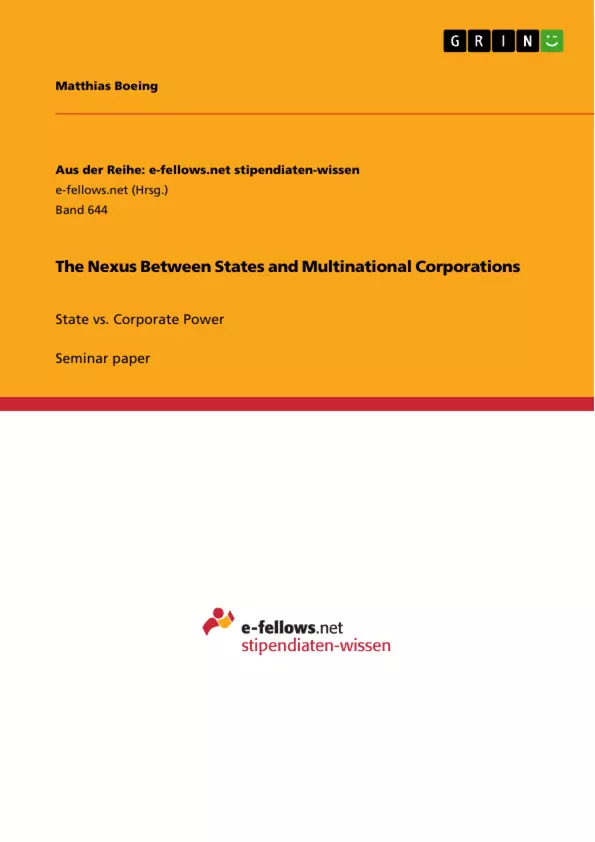One of the most discussed developments in contemporary political economy is the evolving relationship between states and multinational corporations. With its origins in the Peace of Westphalia in 1648, states have long been the most powerful force in economy. However, with the end of the Cold War around 1990 and the evolution of liberalism and neo liberalism, states began to pull back from former state-ruled political decisions. The ideas of the Washington Consensus, mainly shaped by the American economist Milton Friedman and the Chicago School, were voluntarily adopted by many states worldwide, promoting liberalization of markets and trade as well as financial deregulation. The state has repositioned itself as a passive or acquiescent actor within the economy, handing over power to global markets. Consequently, many scholars argue that multinational corporations (MNCs), as another major actor within the economy, have gained power, threatening the sovereignty of states. However, the discussion between different scholars varies widely in terms of whether the state has lost its entire power or still remains a powerful and equal counterpart to MNCs.
This essay discusses the nexus between states and MNCs. Furthermore, it will examine what impact institutions have on this relationship considering evidence from recent times. Consequently, it will provide concepts on how to ensure a better functioning of the global economy whilst bearing in mind different perspectives.
Table of Contents
- INTRODUCTION
- THE NEXUS BETWEEN STATES AND CORPORATIONS
- STATES, MNCS AND THE BARGAINING PROCESS.
- INSTITUTIONS AND THE BARGAINING PROCESS.
- UNIFIED BUT IN CONTRADICTORY ROLES.
- MAKING GLOBALIZATION WORK
- CONCLUSION
Objectives and Key Themes
This essay analyzes the evolving relationship between states and multinational corporations (MNCs) in the context of globalization. It explores the shifting balance of power in the post-Cold War era, where states have increasingly embraced neoliberal economic policies. The essay examines the impact of institutions on the bargaining process between states and MNCs, considering how factors like transfer pricing and regulatory arbitrage affect the relationship. It also discusses potential ways to ensure a better functioning of the global economy, acknowledging different perspectives on the issue.
- The evolving relationship between states and multinational corporations in the context of globalization
- The impact of neoliberal economic policies on the power dynamics between states and MNCs
- The role of institutions in shaping the bargaining process between states and MNCs
- The challenges posed by transfer pricing and regulatory arbitrage to the relationship between states and MNCs
- Potential solutions for creating a better functioning global economy
Chapter Summaries
The introduction sets the context by discussing the historical evolution of the state's role in the global economy. It explores the impact of the Washington Consensus and the rise of neoliberalism on the relationship between states and MNCs. The essay then dives into the nexus between states and MNCs, exploring the bargaining process and its impact on the global economy. The essay highlights the conflicting objectives of states and MNCs, particularly concerning profit maximization and economic growth. It analyzes the role of institutions in influencing this dynamic, focusing on the impact of transfer pricing and regulatory arbitrage on the bargaining process. The essay concludes by examining ways to ensure a better functioning global economy, considering the challenges posed by the shifting balance of power between states and MNCs.
Keywords
This essay focuses on the relationship between states and multinational corporations (MNCs) in the context of globalization. Key terms include the Washington Consensus, neoliberalism, bargaining process, transfer pricing, regulatory arbitrage, and global economic governance.
Frequently Asked Questions
How has the relationship between states and MNCs evolved?
Historically, states were the dominant actors. However, post-Cold War neoliberalism and the Washington Consensus led states to pull back from market intervention, allowing Multinational Corporations (MNCs) to gain significant power.
What is the 'Washington Consensus'?
It is a set of economic policy prescriptions promoting market liberalization, privatization, and financial deregulation, largely influenced by Milton Friedman and the Chicago School.
What is regulatory arbitrage?
Regulatory arbitrage occurs when MNCs take advantage of differences in regulations or taxes between countries to maximize profits, such as shifting production to countries with lower environmental standards.
How does transfer pricing affect state sovereignty?
Transfer pricing allows MNCs to shift profits to low-tax jurisdictions by manipulating prices for internal transactions. This reduces tax revenue for states, challenging their ability to fund public services.
Do states still remain powerful counterparts to MNCs?
Scholars debate this; while some argue MNCs threaten state sovereignty, others believe states still hold ultimate power through law-making and control over territory and infrastructure.
- Arbeit zitieren
- Matthias Boeing (Autor:in), 2013, The Nexus Between States and Multinational Corporations, München, GRIN Verlag, https://www.grin.com/document/209806



